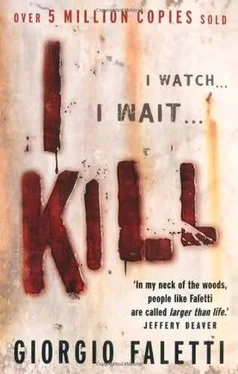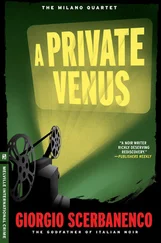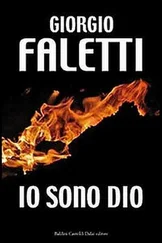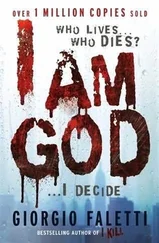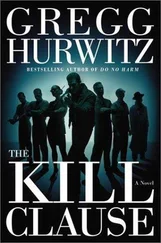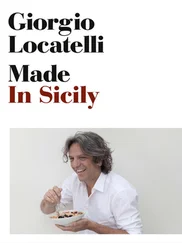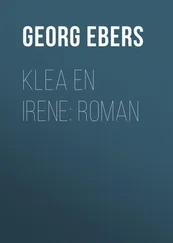I kill…
Despite the warm summer air, he shivered in his unlined cotton jacket. A trickle of sweat ran down from his right armpit to his belt.
‘Then what happened?’ he asked in a suddenly different tone.
The man didn’t notice, or else he must have thought it was the normal reaction of a squeamish tourist who gagged at the sight of blood.
‘Well, it was pretty obvious what had happened, so after excluding any other possible options, it went down as a double murder-suicide. Not good publicity for La Patience.’
‘Any heirs?’
‘I was getting to that. No heirs, so the farm went to the town council. It was put up for sale, but who’d want to buy it after what happened? I wouldn’t take it if they paid me. The council handed it over to the same estate agency and they rent out the land. They get maintenance costs out of it and so forth. I come up once in a while to keep the weeds from taking over what’s left of the house.’
‘Where are the victims buried?’
Hulot tried to make his questions sound like those of a normal, curious person, but he needn’t have bothered. The man was so keen to tell the story that he probably would have finished it even if Hulot had walked off in mid-sentence.
‘In the cemetery down in town, I think. The one on the hill. You must’ve seen it if you’ve been down around there.’
Hulot vaguely recalled a cemetery near the car park where he had stopped earlier.
‘And what was their name, the people who lived here, I mean?’
‘I don’t remember exactly. Something with Le… Legrand or Le Normand, something like that.’
Hulot made a point of looking at his watch.
‘Goodness, it’s late. Time sure does fly when you’re hearing a good story. My friends will be wondering what happened to me. Thanks for telling me about it.’
‘You’re welcome. My pleasure. Have a good holiday.’
The man turned around and went to let Bertot benefit from his expertise. As he was getting into the car, Hulot heard him call out, ‘Hey, listen, if you want to eat some really good fish, take your friends to La Coquille d’Or down at the wharf. If you get ripped off somewhere else, don’t blame me. Remember, La Coquille d’Or. It’s my brother-in-law’s place. Tell him Gaston sent you. He’ll take good care of you.’
My, my Gaston. Gaston-le-beau. How about that – I guessed right. Today’s my lucky day.
As he drove excitedly back to Cassis to visit the local cemetery, Nicolas Hulot knew that he would need a great deal more luck if he really wanted to settle the score.
Nicolas Hulot pulled the ticket out of the machine at the entrance to the Parking de la Viguerie and put his car back in the same spot where he had parked it before. From there he could see, a little further up, a tiny cemetery surrounded by cypress trees. He left his car, walked out of the garage, and started up the road that seemed to be a continuation of the one he had walked down earlier. Just before the cemetery, he saw a cement playground with a tennis and basketball court. A group of boys were dribbling a ball, intent on a half-court game.
Strange, he thought, that there would be a basketball court right next to a cemetery. Strange in a good way. It wasn’t a lack of respect, but rather the simple, natural juxtaposition of life and death, without fear or false modesty. If he believed in ghosts, he would say it was a way for the living to share a little life with those who no longer had any.
He reached the long perimeter wall of the cemetery. A blue street sign hanging from a lamp told him that he was on Allée du Souvenir Français. Another sign on a wall built into the hillside said the same thing. He walked a few hundred feet to a dirt road leading to a gate under an archway. Next to the gate, another sign hanging from a weather-beaten notice board said that the caretaker was there from 8 a.m. to 5 p.m. in the winter months and to dusk in the summer.
Hulot passed beneath the archway and into the cemetery, the gravel crunching beneath his shoes. Otherwise, the cemetery was in total silence. It made no difference that those boys were playing ball not far away, or that the town was full of tourists in the heat of summer and cars coming and going on the road. The wall seemed to have some special sound-absorbing property that did not remove the noise, but altered it so that it became part of the silence that reigned inside.
He walked slowly along the path among the graves.
The excitement from his meagre progress in the investigation had worn off somewhat during the short drive from La Patience. Now was the time for rational thought. Now he had to remind himself that someone’s life depended on him and what he might find out.
The cemetery was very small. A series of paths forming a checkerboard pattern. There was a flight of steps on the right, built to make better use of the little available space. It led up to a series of terraces with other graves, dug into the hillside that continued beyond the fence. An enormous cypress rose into the clear sky at the centre of the cemetery. To the right and left were two small brick buildings with red tile roofs. Judging from the cross on top, the one on the right was a chapel of rest. The other was probably a toolshed. As he stood looking at it, the wooden door opened and a man came out.
Hulot walked towards him, wondering how he should introduce himself. As actors and policemen – both masters of deception – often do, he decided to go with the moment and improvise. He approached the man, who had now seen him as well.
‘Good afternoon.’
‘Evening, sir.’
Hulot looked at the sun moving towards a triumphant sunset and realized that he hadn’t even noticed how much time had passed.
‘Heavens, is it that late? I’m sorry.’ He stood there for a moment and then decided to play the curious tourist. He tried again to act the innocent. ‘Are you the caretaker?’
‘Iam.’
‘Listen, someone in town just told me a horrible story, something that happened here a while ago, at-’
‘You mean La Patience?’ the caretaker interrupted.
‘That’s right. I was wondering, just out of curiosity, if I could see the graves.’
‘You a cop?’
Nicolas stared at him, speechless. From his expression, the other man could tell that he was right and he smiled.
‘Don’t worry. It’s not written all over your face. Just that I used to be a delinquent sort of kid and got in a lot of trouble with the police, so I can always recognize a cop a mile off.’ Hulot neither confirmed nor denied it. ‘You want to see the Legrand graves, right? Come with me.’
Hulot asked no questions. If the man had a troubled past and had come to live in a small town where some people want to know everything and some prefer to know nothing, it was pretty clear which side he was on.
Hulot followed him to the steps leading to the terraces. They climbed a few steps and the caretaker turned left at the first landing. He stopped in front of a few graves grouped together. Hulot let his gaze run over the headstones. Each had a very simple epitaph, a name and date chiselled in the stone.
Laura de Dominicis 1943-1971
Daniel Legrand 1970-1992
Marcel Legrand 1992
Françoise Mautisse 1992
There were no photographs on the headstones. He’d noticed them on many of the other graves. Given the situation, he could understand why there weren’t any, although he would have liked to have some faces to use for reference. The caretaker seemed to have read his mind.
‘There aren’t any photos on the graves because they were all destroyed during the fire.’
‘Why are the birth dates missing on two of them?’
‘The two that have the birth dates are the mother and child. I think we didn’t get the other two birth dates in time. And then later…’ He waved his hand to indicate that afterwards nobody had cared about adding them.
Читать дальше
